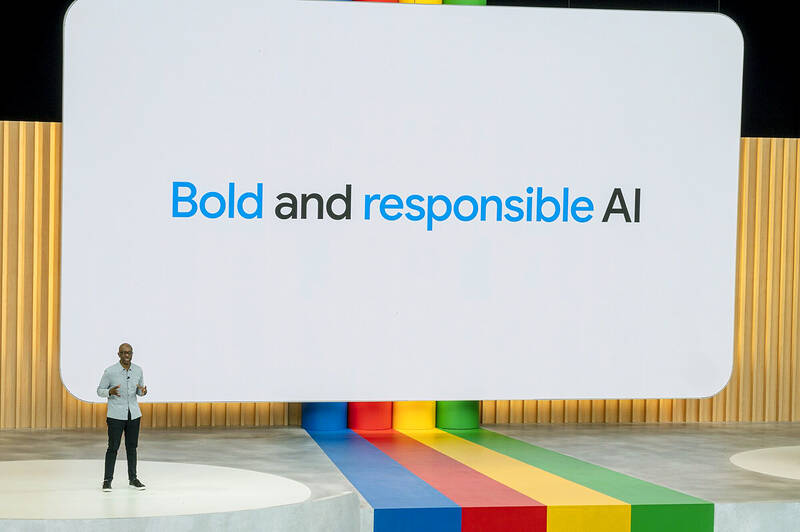Google on Wednesday said that it is opening Bard, a rival to Microsoft Corp-backed ChatGPT, to 180 countries as it expands use of artificial intelligence (AI) across its platform.
Executives at an annual Google developers conference in Silicon Valley said that generative AI would also be used to supercharge the tech giant’s leading search engine.
“We have been applying AI for a while, with generative AI we are taking the next step,” Google chief executive Sundar Pichai told thousands of developers gathered for the event.

Photo: Bloomberg
“We are reimagining all our core products, including search,” he said.
Google is racing to catch up with Microsoft, which has rushed to integrate ChatGPT-like powers in a wide array of its products, including the Bing search engine.
Google Search vice president Cathy Edwards said the new experience would be akin to a search that is “supercharged” by a conversational bot.

Photo: Bloomberg
Other Google executives laid out how generative AI is being woven into Gmail, photo editing, online work tools and more.
The company’s AI efforts would be carried out in a “bold and responsible” way, senior product director Jack Krawczyk said during a briefing.
Google’s expansion meant it removed a waitlist for Bard, letting users around the world engage with it in English after months of testing it out in the US and Britain.

Photo: AFP
Bard would be modified to support 40 languages in coming months, Krawczyk said.
“We’re excited to get Bard into more people’s hands,” he said. “We’re pretty fired up about where Bard is going.”
Google also announced browser “extensions” that would imbue apps and services such as Gmail and Maps with AI features.
Bard technology would enable features such as filling in text to help draft e-mails and suggesting ideas for artwork by scrutinizing a picture of available supplies.
Google is also letting partners build such extensions, including one from Adobe Inc that would let users generate images, Krawczyk said.
The tech titan also unveiled new Pixel devices including a US$1,799 foldable smartphone with a bendable screen that is the size of a tablet computer when opened.
"You're getting the best of both worlds," Google senior vice president of devices Rick Osterloh said of the Fold.
"It's a powerful smartphone when it's convenient and an immersive tablet when you need one."
Google also added a new tablet and a lower-priced version of its flagship smartphone to the Pixel lineup.
Google’s announcements came a week after Microsoft expanded public access to its generative AI programs, which are powered by models made by OpenAI Inc, the company behind ChatGPT.
“This could be a defining moment in the AI battle with Google and Microsoft going head-to-head for market share,” Wedbush Securities Inc analyst Dan Ives said in a note to investors.
Microsoft's early investment in OpenAI gave it a head start "in this Game of Thrones Battle for Big Tech with Google now playing major catchup mode," Ives added.
AI-enhanced features of Microsoft’s Bing search engine and Edge Internet browser recently became open for anyone.
The services have been enhanced with the ability to work with images as well as text, and Microsoft intends to add video to the mix.
Despite the rollouts by two of the world’s biggest companies, risks from AI include its potential uses for disinformation, with voice clones, deep-fake videos and convincing written messages.

When an apartment comes up for rent in Germany’s big cities, hundreds of prospective tenants often queue down the street to view it, but the acute shortage of affordable housing is getting scant attention ahead of today’s snap general election. “Housing is one of the main problems for people, but nobody talks about it, nobody takes it seriously,” said Andreas Ibel, president of Build Europe, an association representing housing developers. Migration and the sluggish economy top the list of voters’ concerns, but analysts say housing policy fails to break through as returns on investment take time to register, making the

NOT TO WORRY: Some people are concerned funds might continue moving out of the country, but the central bank said financial account outflows are not unusual in Taiwan Taiwan’s outbound investments hit a new high last year due to investments made by contract chipmaker Taiwan Semiconductor Manufacturing Co (TSMC, 台積電) and other major manufacturers to boost global expansion, the central bank said on Thursday. The net increase in outbound investments last year reached a record US$21.05 billion, while the net increase in outbound investments by Taiwanese residents reached a record US$31.98 billion, central bank data showed. Chen Fei-wen (陳斐紋), deputy director of the central bank’s Department of Economic Research, said the increase was largely due to TSMC’s efforts to expand production in the US and Japan. Investments by Vanguard International

WARNING SHOT: The US president has threatened to impose 25 percent tariffs on all imported vehicles, and similar or higher duties on pharmaceuticals and semiconductors US President Donald Trump on Wednesday suggested that a trade deal with China was “possible” — a key target in the US leader’s tariffs policy. The US in 2020 had already agreed to “a great trade deal with China” and a new deal was “possible,” Trump said. Trump said he expected Chinese President Xi Jinping (習近平) to visit the US, without giving a timeline for his trip. Trump also said that he was talking to China about TikTok, as the US seeks to broker a sale of the popular app owned by Chinese firm ByteDance Ltd (字節跳動). Trump last week said that he had

STRUGGLING TO SURVIVE: The group is proposing a consortium of investors, with Tesla as the largest backer, and possibly a minority investment by Hon Hai Precision Nissan Motor Co shares jumped after the Financial Times reported that a high-level Japanese group has drawn up plans to seek investment from Elon Musk’s Tesla Inc to aid the struggling automaker. The group believes the electric vehicle (EV) maker is interested in acquiring Nissan’s plants in the US, the newspaper reported, citing people it did not identify. The proposal envisions a consortium of investors, with Tesla as the largest backer, but also includes the possibility of a minority investment by Hon Hai Precision Industry Co (鴻海精密) to prevent a full takeover by the Apple supplier, the report said. The group is